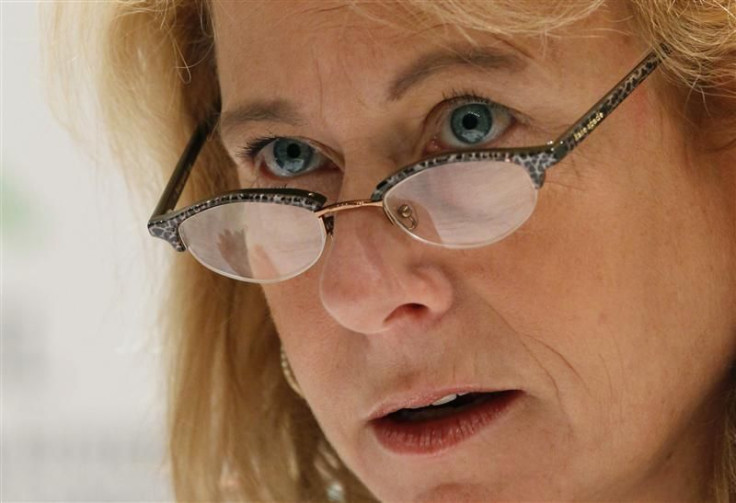The Lady Vanishes: With Cynthia Carroll’s Resignation, Only Two FTSE-100 Firms Run By Women

Cynthia Carroll has resigned as the chief executive officer of mining behemoth Anglo-American plc after almost six years under enormous shareholder pressure arising from continuing strikes in South Africa and a dramatic fall in profits.
Carroll reportedly quit on her own volition, although the vultures had been circling around her for quite a while.
Management Today reported that Anglo-Americans profits plunged by 38 percent this year from 2011, while revenues fell by 10 percent. Moreover, the ongoing strike by thousands of miners in South African have seriously dented the company’s platinum production, suggesting the weak results may persist.
The company’s market value has also been cut by about one-quarter since Carroll took the helm in March 2007.
However, the American-born Carroll was unique in that she was the first non-South African – and more importantly – the first woman ever to lead Anglo-American. Moreover, her departure comes on the heels of the resignation of another prominent female CEO of an FTSE-100 company, Dame Marjorie Scardino of British publishing giant, Pearson plc. In fact, Scardino (who will be replaced by a man named John Fallon), was the first woman ever to take over a FTSE-100 firm sixteen years ago.
The exits of Carroll and Scardino now leaves only two women CEOs at companies in the FTSE-100 index -- Alison Cooper of Imperial Tobacco Group and Angela Ahrendts at Burberry Group. (Interestingly, three of the four aforementioned ladies – Carroll, Scardino, and Ahrendts – are all American, not British).
“It does reflect badly on U.K. corporate governance,” Manish Singh, head of investment at Crossbridge Capital in London, told Bloomberg.
“The U.K. is a G-8 nation. If we don’t see women represented well here, what hope do we have of achieving it in the rest of the world?”
Carroll’s departure coincided with the failure by the European Union to establish a quota that would require 40 percent of company supervisor boards to be occupied by women by the year 2020.
In the U.S., women have a somewhat more pronounced presence in the corridors of corporate power. According to Fortune Magazine, 20 of the Fortune 500 companies (a new all-time record) are now headed by women, including such high-profile names as Meg Whitman at Hewlett-Packard, Indra Nooyi at PepsiCo, and Marissa Mayer, the new chief executive at Yahoo.
However, that means only 4 percent of the most prestigious jobs in U.S. corporations are held by females.
Some of the women in these positions believe gender has been irrelevant to their success, but insist rather that talking risks play a greater role.
Angela Braly, the CEO of WellPoint Inc., told the Wall Street Journal earlier this year: ‘The most important factor in determining whether you will succeed isn't your gender, it's you. Be open to opportunity and take risks. In fact, take the worst, the messiest, the most challenging assignment you can find, and then take control."
Similarly, Beth Mooney, the boss of KeyCorp, declared: "I have stepped up to many 'ugly' assignments that others didn't want."
Forced quotas may not be the answer to increasing female representation on company boardroom either.
Helena Morrissey, chief executive officer of Newton Investment Management Ltd. in London, told Bloomberg: “A quota doesn’t get you a CEO. This [lack of women CEOs] shows the importance of building a pipeline of strong women executives.”
Laura Gonzalez, an assistant professor of finance and business economics at Fordham University in New York commented that women face unique problems and pressures when they enter corporations
“We need longer maternity leaves… and flexible schedules with salaries based on goals and the possibility of working from home if needed one day,” she said.
“Companies are moving in that direction, but for the most part not at the executive level – that is, positions which require frequent travel. Most likely the only way for women to be able to have a family and work at the executive level is for society to accept husbands being the primary care-takers of the children and having enough support.”
In a commentary on CNBC, Catherine Boyle partially attributed the dearth of women executives to educational issues related to gender.
“While women outperform men at most earlier educational levels, when it comes to MBA time, only half as many women as men get those three letters after their names,” she wrote.
“This may be because MBAs are often done in the late twenties, when people of both genders are starting to think about marriage and children.”
She concluded: “Whatever is preventing women getting their feet under the boardroom table, it seems unlikely to be solved soon."
© Copyright IBTimes 2024. All rights reserved.





















